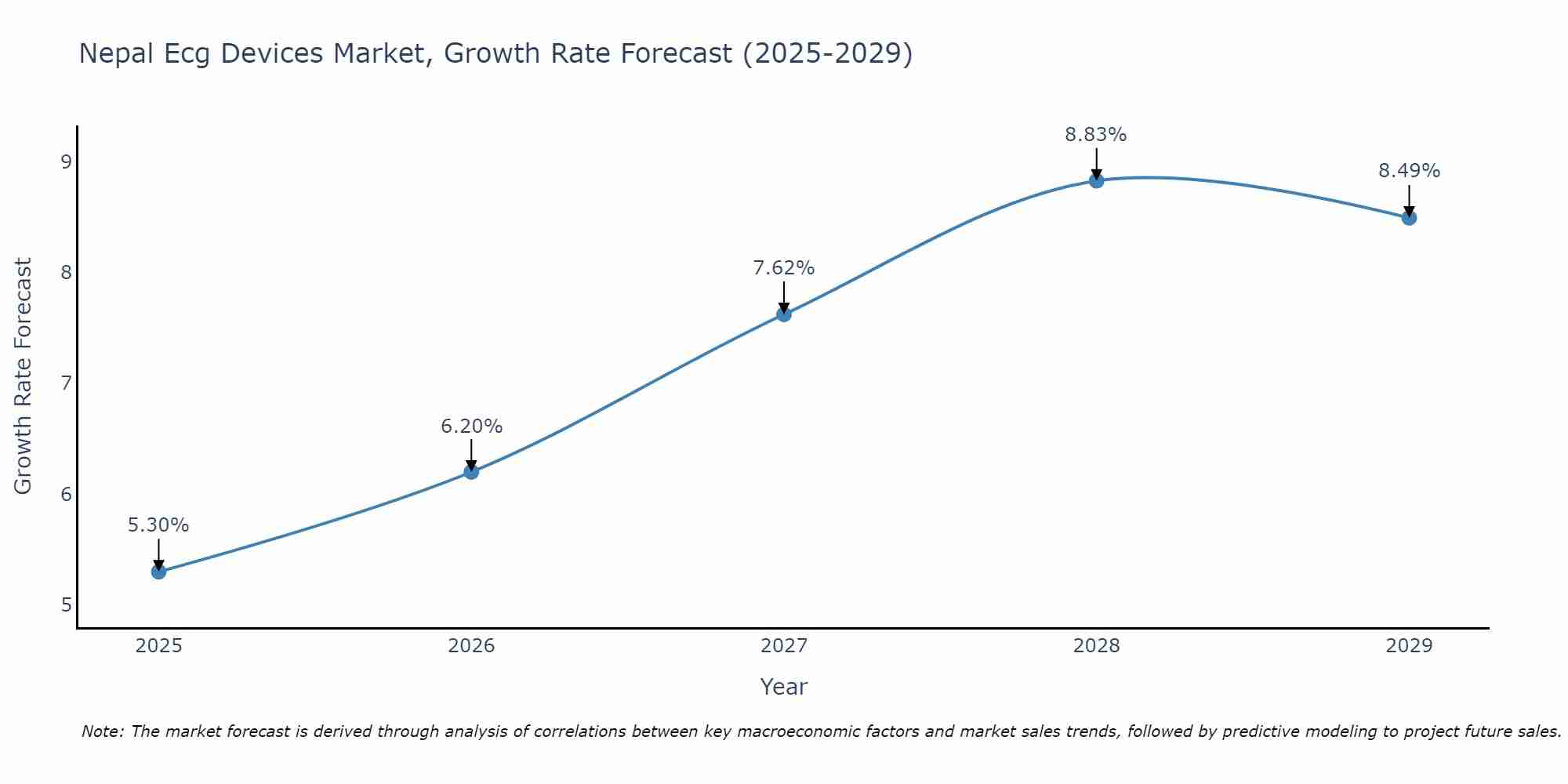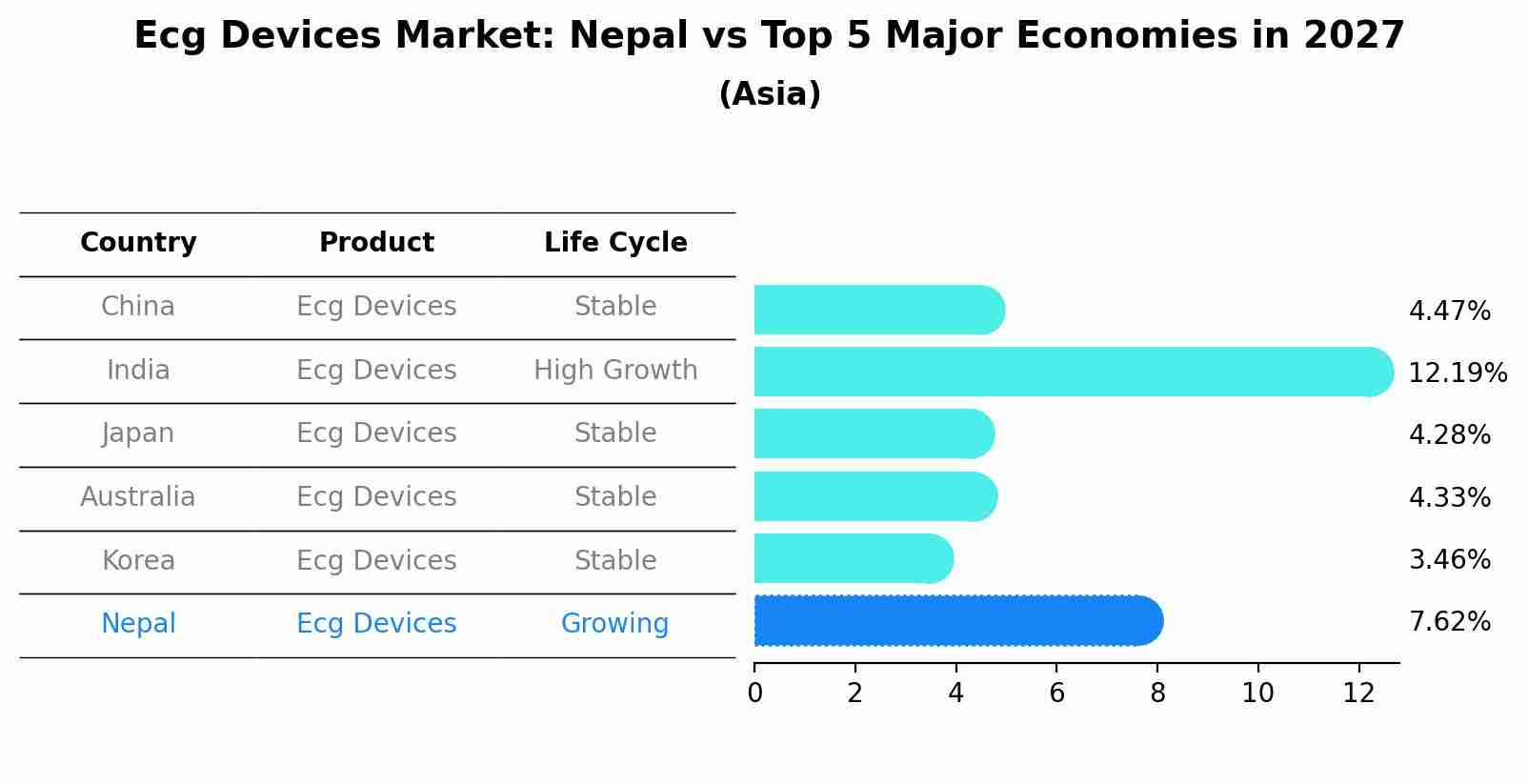Nepal Ecg Devices Market (2025-2031) Outlook | Companies, Revenue, Size, Forecast, Share, Growth, Trends, Analysis, Industry & Value
| Product Code: ETC363396 | Publication Date: Aug 2022 | Updated Date: Aug 2025 | Product Type: Market Research Report | |
| Publisher: 6Wresearch | Author: Dhaval Chaurasia | No. of Pages: 75 | No. of Figures: 35 | No. of Tables: 20 |
Nepal Ecg Devices Market Size Growth Rate
The Nepal Ecg Devices Market is projected to witness mixed growth rate patterns during 2025 to 2029. The growth rate begins at 5.30% in 2025, climbs to a high of 8.83% in 2028, and moderates to 8.49% by 2029.

Ecg Devices Market: Nepal vs Top 5 Major Economies in 2027 (Asia)
By 2027, the Ecg Devices market in Nepal is anticipated to reach a growth rate of 7.62%, as part of an increasingly competitive Asia region, where China remains at the forefront, supported by India, Japan, Australia and South Korea, driving innovations and market adoption across sectors.

Nepal Ecg Devices Market Synopsis
The Nepal ECG devices market is experiencing steady growth driven by increasing awareness about cardiovascular diseases and the rising prevalence of heart-related conditions in the country. The demand for ECG devices is also being fueled by advancements in healthcare infrastructure, an aging population, and a growing focus on preventive healthcare measures. Key players in the market are offering a range of ECG devices, including portable and wireless options, to cater to the diverse needs of healthcare providers and patients. With the government`s initiatives to improve healthcare access and quality, the Nepal ECG devices market is expected to continue its growth trajectory, presenting opportunities for both local and international manufacturers to expand their presence in the market.
Nepal Ecg Devices Market Trends
The Nepal ECG devices market is experiencing a shift towards portable and wireless devices, allowing for increased convenience and mobility for patients. With the growing adoption of telemedicine and remote monitoring services, there is a rising demand for ECG devices that can provide real-time data transmission to healthcare providers. Additionally, there is a focus on the development of advanced ECG technologies such as artificial intelligence and machine learning algorithms for more accurate and efficient diagnosis of cardiovascular conditions. The market is also witnessing collaborations between healthcare providers and technology companies to enhance the accessibility and affordability of ECG devices, especially in rural areas. Overall, the Nepal ECG devices market is moving towards innovation, digitalization, and improved patient care outcomes.
Nepal Ecg Devices Market Challenges
Some challenges faced in the Nepal ECG devices market include limited access to advanced technology in remote areas, inadequate healthcare infrastructure and facilities, lack of skilled healthcare professionals for interpreting ECG results, affordability issues for patients, and regulatory hurdles in terms of product registration and approval. Additionally, there may be a lack of awareness among the general population about the importance of regular ECG screenings for cardiac health, leading to underutilization of ECG devices. Addressing these challenges would require investments in healthcare infrastructure, training programs for healthcare professionals, public health campaigns to raise awareness, and streamlined regulatory processes to ensure timely access to innovative ECG devices in Nepal.
Nepal Ecg Devices Market Investment Opportunities
The Nepal ECG devices market presents several investment opportunities due to the increasing prevalence of cardiovascular diseases in the country and the rising demand for advanced healthcare technologies. Investors can consider opportunities in the sales and distribution of ECG devices, as well as in establishing partnerships with local healthcare providers to offer ECG testing services. Additionally, there is potential for investment in the development of innovative ECG technologies tailored to the needs of the Nepalese market, such as portable and cost-effective devices suitable for rural healthcare settings. With the government`s focus on improving healthcare infrastructure and services, investing in the Nepal ECG devices market can be a promising venture for those looking to capitalize on the growing demand for cardiac care solutions in the country.
Jordan Agar Market Government Policies
The government of Nepal has implemented policies to regulate the medical device market, including ECG devices. The Department of Drug Administration (DDA) oversees the registration, import, and manufacturing of medical devices, including ECG machines, to ensure quality and safety standards are met. Companies must obtain approval from the DDA before marketing or selling ECG devices in Nepal. Additionally, importers are required to comply with regulations such as obtaining a license from the DDA and adhering to labeling requirements. The government aims to protect public health by ensuring that only approved and safe ECG devices are available in the market, promoting transparency and accountability in the medical device sector.
Nepal Ecg Devices Market Future Outlook
The future outlook for the Nepal ECG devices market appears promising, driven by factors such as the increasing prevalence of cardiovascular diseases, a growing geriatric population, and rising awareness about early detection of heart conditions. Technological advancements in ECG devices, such as portable and wireless options, are also expected to fuel market growth. Additionally, government initiatives focusing on improving healthcare infrastructure and access to medical devices are likely to create opportunities for market expansion. However, challenges like limited healthcare expenditure and a lack of skilled professionals may hinder the market`s full potential. Overall, with a growing focus on preventive healthcare and advancements in healthcare technology, the Nepal ECG devices market is projected to experience steady growth in the coming years.
Key Highlights of the Report:
- Nepal Ecg Devices Market Outlook
- Market Size of Nepal Ecg Devices Market, 2024
- Forecast of Nepal Ecg Devices Market, 2031
- Historical Data and Forecast of Nepal Ecg Devices Revenues & Volume for the Period 2021 - 2031
- Nepal Ecg Devices Market Trend Evolution
- Nepal Ecg Devices Market Drivers and Challenges
- Nepal Ecg Devices Price Trends
- Nepal Ecg Devices Porter's Five Forces
- Nepal Ecg Devices Industry Life Cycle
- Historical Data and Forecast of Nepal Ecg Devices Market Revenues & Volume By Product Type for the Period 2021 - 2031
- Historical Data and Forecast of Nepal Ecg Devices Market Revenues & Volume By ECG Resting System for the Period 2021 - 2031
- Historical Data and Forecast of Nepal Ecg Devices Market Revenues & Volume By ECG Holter Monitoring System for the Period 2021 - 2031
- Historical Data and Forecast of Nepal Ecg Devices Market Revenues & Volume By ECG Stress Testing System for the Period 2021 - 2031
- Historical Data and Forecast of Nepal Ecg Devices Market Revenues & Volume By Cardiopulmonary Stress Testing System for the Period 2021 - 2031
- Historical Data and Forecast of Nepal Ecg Devices Market Revenues & Volume By End User for the Period 2021 - 2031
- Historical Data and Forecast of Nepal Ecg Devices Market Revenues & Volume By Hospitals for the Period 2021 - 2031
- Historical Data and Forecast of Nepal Ecg Devices Market Revenues & Volume By Diagnostic centre for the Period 2021 - 2031
- Historical Data and Forecast of Nepal Ecg Devices Market Revenues & Volume By Clinics for the Period 2021 - 2031
- Historical Data and Forecast of Nepal Ecg Devices Market Revenues & Volume By Ambulatory Surgical Centre for the Period 2021 - 2031
- Nepal Ecg Devices Import Export Trade Statistics
- Market Opportunity Assessment By Product Type
- Market Opportunity Assessment By End User
- Nepal Ecg Devices Top Companies Market Share
- Nepal Ecg Devices Competitive Benchmarking By Technical and Operational Parameters
- Nepal Ecg Devices Company Profiles
- Nepal Ecg Devices Key Strategic Recommendations
Frequently Asked Questions About the Market Study (FAQs):
- Single User License$ 1,995
- Department License$ 2,400
- Site License$ 3,120
- Global License$ 3,795
Search
Thought Leadership and Analyst Meet
Our Clients
Related Reports
- Afghanistan Apparel Market (2026-2032) | Growth, Outlook, Industry, Segmentation, Forecast, Size, Companies, Trends, Value, Share, Analysis & Revenue
- Canada Oil and Gas Market (2026-2032) | Share, Segmentation, Value, Industry, Trends, Forecast, Analysis, Size & Revenue, Growth, Competitive Landscape, Outlook, Companies
- Germany Breakfast Food Market (2026-2032) | Industry, Share, Growth, Size, Companies, Value, Analysis, Revenue, Trends, Forecast & Outlook
- Australia Briquette Market (2025-2031) | Growth, Size, Revenue, Forecast, Analysis, Trends, Value, Share, Industry & Companies
- Vietnam System Integrator Market (2025-2031) | Size, Companies, Analysis, Industry, Value, Forecast, Growth, Trends, Revenue & Share
- ASEAN and Thailand Brain Health Supplements Market (2025-2031) | Strategy, Consumer Insights, Analysis, Investment Trends, Opportunities, Growth, Size, Share, Industry, Revenue, Segments, Value, Segmentation, Supply, Forecast, Restraints, Outlook, Competition, Drivers, Trends, Demand, Pricing Analysis, Competitive, Strategic Insights, Companies, Challenges
- ASEAN Bearings Market (2025-2031) | Strategy, Consumer Insights, Analysis, Investment Trends, Opportunities, Growth, Size, Share, Industry, Revenue, Segments, Value, Segmentation, Supply, Forecast, Restraints, Outlook, Competition, Drivers, Trends, Demand, Pricing Analysis, Competitive, Strategic Insights, Companies, Challenges
- Europe Flooring Market (2025-2031) | Outlook, Share, Industry, Trends, Forecast, Companies, Revenue, Size, Analysis, Growth & Value
- Saudi Arabia Manlift Market (2025-2031) | Outlook, Size, Growth, Trends, Companies, Industry, Revenue, Value, Share, Forecast & Analysis
- Uganda Excavator, Crane, and Wheel Loaders Market (2025-2031) | Strategy, Consumer Insights, Analysis, Investment Trends, Opportunities, Growth, Size, Share, Industry, Revenue, Segments, Value, Segmentation, Supply, Forecast, Restraints, Outlook, Competition, Drivers, Trends, Demand, Pricing Analysis, Competitive, Strategic Insights, Companies, Challenges
Industry Events and Analyst Meet
Whitepaper
- Middle East & Africa Commercial Security Market Click here to view more.
- Middle East & Africa Fire Safety Systems & Equipment Market Click here to view more.
- GCC Drone Market Click here to view more.
- Middle East Lighting Fixture Market Click here to view more.
- GCC Physical & Perimeter Security Market Click here to view more.
6WResearch In News
- Doha a strategic location for EV manufacturing hub: IPA Qatar
- Demand for luxury TVs surging in the GCC, says Samsung
- Empowering Growth: The Thriving Journey of Bangladesh’s Cable Industry
- Demand for luxury TVs surging in the GCC, says Samsung
- Video call with a traditional healer? Once unthinkable, it’s now common in South Africa
- Intelligent Buildings To Smooth GCC’s Path To Net Zero


















